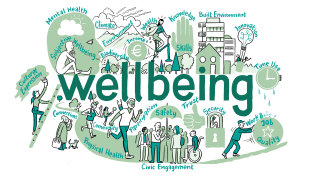Continuing Cost of Living Pressures to Declining Optimism: What the 2024 EU Quality of Life Survey Reveals

As we look towards the future, the quality of life across Europe remains a vital benchmark for assessing societal progress. The latest Quality of life in the EU in 2024: Results from the Living and Working in the EU e-survey from Eurofound presents key insights into the economic and social the well-being of people across the European Union (EU). The findings highlight the lingering effects of the pandemic and reveal deepening financial and social inequalities. The point to increasing financial hardship, declining work–life balance, and growing difficulties in accessing healthcare, all of which demand urgent attention.
Key Findings
1. Financial Hardship and Cost of Living Pressures
The cost-of-living crisis continues to be a major concern for people across the EU, with low- and middle-income households disproportionately affected.
30 per cent of respondents reported difficulty making ends meet, up from 22 per cent in 2023.
10 per cent missed rent or mortgage payments, while 15 per cent reported arrears in utility bills—both reflecting year-on-year increases.
Financial difficulties were particularly pronounced among women aged 50–64 (rising from 26 per cent to 42 per cent) and those aged 35–49 (24 per cent to 37 per cent).
2. Work–Life Balance and Remote Work Trends
The decline in remote work across the EU has continued post-pandemic, with significant differences between countries.
The proportion of women working exclusively from home decreased from 14 per cent in 2022 to 10 per cent in 2024, while for men, it fell from 10 per cent to 7 per cent.
Over 50 per cent of respondents expressed a preference for hybrid working, highlighting a gap between workplace policies and worker preferences.
Work-related stress has risen to 30 per cent, reaching the same levels reported during the height of the pandemic.
3. Trust and Quality of Society
Public trust in institutions remains fragile, with notable declines in confidence across key areas.
Trust in national governments has steadily declined over the past four years.
- Young people trust the EU more than older groups, but their trust has declined more sharply compared to other age groups.
Trust in social media has been in continuous decline since 2021, while trust in traditional news media has fluctuated.
- Interpersonal trust is highest among the oldest (5.4) and youngest (5.1) age groups, while middle-age groups report lower levels of trust.
4. Mental Health and Healthcare Access
Mental well-being has deteriorated across most age groups, with notable challenges in accessing healthcare services.
Women, particularly those aged 18–24, report significantly poorer mental health than men.
25 per cent of respondents reported being unable to access healthcare in the past year, with 22 per cent currently experiencing untreated medical issues.
The most common barriers to healthcare access were long waiting times, availability of services, and cost.
5. Declining Optimism and Life Satisfaction
Optimism about the future has decreased significantly across all age groups since 2020.
Only 24 per cent of those aged 50–64 and 30 per cent of those aged 35–49 expressed optimism about their future, making them the least optimistic groups.
Optimism declined more sharply for women (from 43 per cent in 2020 to 31 per cent in 2024) compared to men (from 48 per cent to 37 per cent).
Those in low-income households experienced the most significant drop in optimism, widening the gap between wealthier and poorer respondents.
6. Quality of life of respondents with Disabilities
Respondents with disabilities report significantly lower levels of well-being compared to others:
- Their average life satisfaction score is 1.2 points lower than those without disabilities. However, their life satisfaction scores increase when individuals are aged 65 or over, are employed and have a high income.
- Four in ten respondents with disabilities face difficulties making ends meet, compared to two in ten without disabilities.
- 56 per cent of people with disabilities who struggle financially report unmet medical needs, with cost being the primary barrier.
The Living and Working in the EU 2024 survey highlights growing inequalities that are shaping the daily experiences of millions across Europe. Financial hardship, a deteriorating work–life balance, and declining mental well-being disproportionately impact vulnerable groups, particularly low-income households, middle-aged workers, and people with disabilities. Meanwhile, declining trust in institutions and barriers to accessing essential services indicate deeper systemic issues.
To address these challenges, policies must prioritise economic and social equity, ensuring that individuals across all demographics have access to secure incomes, stable employment, and essential public services. Addressing these disparities is essential to building a more inclusive and resilient society, where no one is left behind.
Of note: Due to the nature of data collection, the e-survey is not representative of the entire population. People who do not use the internet, do not use social media or were not invited by another participant cannot be reached by the e-survey. As respondents self-select by clicking on advertisements, the sample is biased. Known biases, such as the overrepresentation of workers, people with higher education, people aged 50–64, and, to a smaller extent, women, are identified and corrected using weighting. However, other biases – such as no access to social media or disinterest in e-survey participation – are unknown and remain uncorrected.